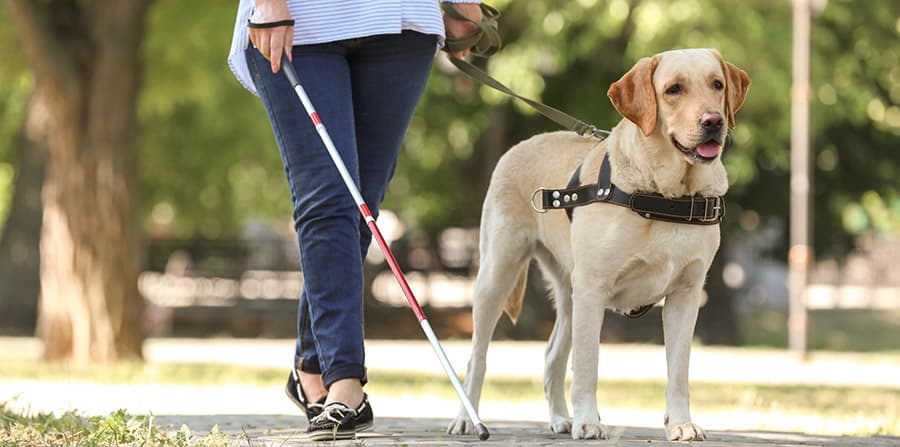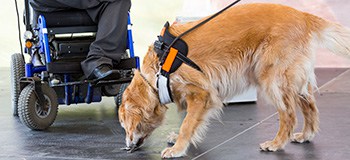
Labradoodles have so many positive qualities that make them good family dogs, and it’s these very qualities that make also Labradoodles great service dogs. What many don’t realize is that the very first Labradoodle was created to be a seeing-eye dog, one of many duties performed by service dogs.
Labradoodles make great service dogs because they possess the qualities needed to perform the duties required. Service dogs are used by people with various types of disabilities; therefore, their duties are also going to vary. Labradoodle service dogs may assist people suffering from blindness, multiple sclerosis cardiac issues, seizures and various other disabilities where they need assistance and regularity in their lives. The one thing that all service dogs must have in common is their ability to be trained to provide a service to their owners.
The qualities that make Labradoodles great service dogs include:
- Intelligence
- Loyalty
- Trainability
- Affectionate
- Low-Shedding & Hypo-Allergenic Coat
- Level Headedness
- Sociable Personality
Whether it’s the attributes the Labradoodle gets from being part Poodle, from being part Labrador Retriever, or a combination of both, the Labradoodle has proven to be highly valuable as a service dog.
Originally Bred to Be a Service Dog
The Labradoodle breed originated in the middle-to-late 1980s in Australia with the help of a Hawaiian woman named Pat Blum. Mrs. Blum was a visually-impaired woman whose husband suffered from severe allergies. She wanted a dog that could act as a seeing-eye dog that wouldn’t affect her husband, and she wanted one as soon as possible. She was unsuccessful at finding such a dog in Hawaii, so she contacted the Australian Royal Guide Dog Association (ARGDA) because their dogs could be imported into Hawaii quickly with little quarantine time.
Saliva and coat samples from about three dozen Standard Poodles were sent to Mr. Blum’s physicians in Hawaii, and they all aggravated his allergies. Wally Conron, an employee at the ARGDA, came up with the idea of breeding a Standard Poodle with a Labrador Retriever. His hope was that the Labrador Retriever’s trainability and gentle nature combined with the Poodle’s intelligence and low-shedding coat would provide the Blum’s with the ideal service dog.
The dam had three puppies, and samples from all three pups were sent to the Blum’s doctor. One of the puppies had the temperament, personality and allergy-compatible coat required to be suitable as a service. This pup, named Sultan, is considered to be the first recorded Labradoodle, and Wally Conron is credited with being the creator of this wonderful dog breed.
What to Look for in a Service Dog
When looking for a service dog, there are more things to consider than just picking your favorite breed. Depending on what your disability might be, different breeds might be better able to provide certain services than other breeds. With so many people suffering from allergies today, that’s often a significant consideration when choosing a service dog. Even if you’re not suffering from allergies, you’ll want to keep this in mind if a close family member has allergies. This is one reason why many people choose Labradoodles.
Whether you’re training the dog to be your service dog or are paying a professional for the dog training or both, you’ll most likely be buying a puppy. Here are some traits you want to see in a potential service dog puppy.
- A desire to retrieve – If a puppy will retrieve something and bring it back to you, it has the desire to please you.
- Doesn’t scare easily – Drop a pan or something that will make a loud noise. While it will startle the puppy, the puppy should also be a little curious and recover quickly from the surprise.
- Interest in being held – Puppies that enjoy being held are generally pups that will be affectionate.
- Desire to follow – The puppy should want to follow you, which is something that it will be doing for most of its life.
- Ability to forgive quickly – Pinch the puppies paw lightly. It may squeal or move away, but it should come back quickly. You do not want a dog that holds a grudge.
- Friendliness – When you call a litter of puppies to you, you don’t want the first one that comes running because this one might grow up to be too aggressive. The last one to come might be shy. The second or third one to come to you might be an ideal choice.
Where Are Labradoodle Service Dogs Used?
Service dogs are used any time a person needs assistance due to a disability. Regardless of how beneficial all service dogs can be, you may have a specific breed in mind. If this is the case, you may want to research agencies that specialize in providing disabled individuals with service dogs. Many organizations offer service dogs to disabled individuals and Labradoodles have become a very popular choice.
One person may like large dogs while another may have a preference for small dogs. Labradoodles are right in the middle in terms of size. The Labradoodle’s low-shedding and hypo-allergenic coat also make them a popular choice. There are various times and places when a service dog may be required or necessary. Historically, German Shepherds and Labrador Retrievers are the dog breeds typically found in service dogs.
Let’s face it, when we think of seeing-eye dogs, it’s the German S
They’ve decided to go with dogs floppy ears, such as Labrador Retrievers and Labradoodles. This is just another of the many areas where Labradoodles are almost proving their worth in gold. Their many wonderful qualities are making them more and more popular as service dogs.
Who Can Benefit From a Labradoodle Service Dog?
Individuals who have disabilities and are unable to perform certain tasks in their lives often can benefit from having a service dog, such as a Labradoodle. The Americans With Disabilities Act (ADA), overseen by the U.S. Department of Justice, describes a service dog as one that is specially trained to do certain jobs for people with disabilities. The work that the dog does must have to do with the person’s disability. Service dogs are not pets but are animals trained to do work and must be alert to their owner’s needs at all times. Service dogs may provide the following services.
- Calming a person with Post Traumatic Stress Disorder (PTSD)
- Protecting an individual who is having or about to have a seizure
- Alerting a deaf person
- Guiding a blind dog
- Reminding a mentally ill person to take required medication
- Calming an individual during an anxiety attack
- Pulling a wheelchair
- Picking up things the individual has dropped
- Retrieving medication for the individual
Service dogs are highly trained animals that can perform tasks that one can only imagine. Their intelligence and abilities are unbelievable. To most disabled individuals, service dogs are not only a valuable and essential part of their lives but also potential lifesavers.
Where Are Service Dogs Allowed?
According to the laws set by ADA, service dogs are allowed any place where the public is served, and this includes local and state governments, businesses and nonprofit organizations. In simpler terms, any part of a facility where the public is can go, the service dog can also go. This also includes hospitals, restaurants, schools, stores, hotels. Not all disabilities are visibly seen, which may result in a business owner questioning why the dog is expected to be allowed in the place.
By law, the business owner can only ask the following two questions.
- Is the dog is a service dog that’s required due to a disability?
- What job or work the dog is trained to perform?
The business cannot ask questions about the person’s disability, ask to see medical proof or request to see any documentation or identification on the service dog. Failure to abide by these laws can result in the business being fined. Individuals who feel that they were discriminated because of the dog or disability or were asked questions other than the two allowed questions are advised to contact and file a complaint with the Department of Justice. There have been many instances where businesses that have not abided by the service dog laws have been fined and required to provide their staff with training on service dog laws and requirements.
Laws Regarding Service Dogs
Even though the ADA requires businesses to allow service dogs on their premises, many owners still have questions regarding certain circumstances. Below are some specific details of which service dog owners should be aware.
- Service dogs must be leashed, tethered or harnessed unless these restraints interfere with the dog’s required work. In this case, the dog must be controlled by voice or hand commands.
- The owner can be asked to remove the dog from the premise if the service dog is not housebroken.
- The owner must be in control of the dog at all times. The only time a service dog can be asked to leave is if the dog is barking, growling or being a menace to others, and the owner is not controlling the situation. This is rare among trained service dogs.
- Fear of dogs or allergies are not reasons to not allow a service dog on a business’s premises. If this situation does arise, the dog and the affected individual should be put in opposite or different areas of the room.
- Service dogs are allowed in places that sell food even if animals are prohibited from being on the premises due to local or state health codes. This includes salad and buffet bars and similar self-service lines.
- The person with a disability cannot be treated differently than other patrons because of the dog or isolated from others.
- A hotel or similar business cannot charge extra the owner a fee for having the service on the premise even if they normally charge an extra fee for pets.
- A business also cannot charge a cleaning fee for a service dog.
- If a service dog does damage while on the premises, the dog’s owner will be expected to pay for the damages.
- The staff at a business are not required to provide a service dog with food or provide any care for the dog.
- Businesses are not required to provide service-dogs-in-training the same privileges as they provide to service dogs.
- Cities or localities cannot require an owner to register the service dog as a service dog.
- A business or municipality cannot restrict a service dog that is a certain breed even if there is an ordinance against that breed.
- Service dogs may wear a vest stating as such or that they are working. People passing by are discouraged from petting the dog because the dog is working and should not be distracted.
There are a few places where a service dog is not automatically allowed to be. These are churches, temples, and places of worship; inside of swimming pools at hotels, fitness centers and municipalities; and sitting on chairs inside of restaurants.
What’s the Difference Between Service Dogs and Therapy Dogs?
There is much misconception about service dogs and therapy/comfort dogs. The terms service dogs and therapy dogs are often used interchangeably despite these two dogs being very different. Whereas service dogs are designed to provide a service for a disabled person, a therapy dog’s job is to give comfort to a person. Therapy dogs engage and interact with patients. They may lie on someone’s bed, allow the person to pet them, listen to them talk, or act in manners that may bring comfort to some upset, sick or under stress.
Therapy dogs are often brought to hospitals, nursing homes, retirement homes, airports or any place where an individual may be in need of comfort. Unlike service dogs, therapy dogs are not allowed in places that do not allow pets because therapy dogs are considered pets rather than working dogs. Therapy dogs are not covered by the service dog laws set by the ADA. If the therapy dog is registered through an organization as a therapy dog, the dog may wear a bandanna or vest that lists the name of the therapy dog organization where the dog came from.
How Expensive Are Labradoodle Service Dogs?
The cost of a Labradoodle service dog, or any service dog for that matter, can depend on the dog and the situation requiring a service dog. Unless you’re lucky and knowledgeable enough to be able to train the dog yourself, you can expect to pay a high price. In some cases, a disabled individual may get the service dog free, but this is rare.
If you pay a professional for the service dog, the price can range from $10,000 to $30,000 or more depending on the dog and the company. Training can take up to 18 months depending on the dog and the type of training required, the training and care for the dog can be costly. The dog may also have to be shipped to a distant location, which can also increase the cost.
Related Questions
Can I train my Labradoodle to be a service dog myself or does it need to be professionally trained?
The ADA does not require that your service dog be professionally trained but does require that the dog meet their service dog requirements and be able to provide the services required. If it’s a minor disability that doesn’t require a lot of detailed and complicated work, you may be able to train it yourself if you have experience. For more serious disabilities, the service dog should be professionally trained. If an individual has a severe disability, the dog will need to be highly trained to perform the job required of him or her every time.
Does my Labradoodle need to be certified as a service dog?
Your service dog is not required to be certified because there is no service dog certification. There are service dog vests or papers of authentication that can be purchased online, but they are not required. Some owners purchase these because they believe it will make it more apparent that the dog is a service animal, and they are less likely to be questioned in a public setting. They may also choose to have the dog wear a vest stating the dog is a service animal to discourage people from petting the dog.
Which gender makes a better service dog?
Most professional trainers state that they do not prefer one sex over the other when it comes to service dogs. They’re all screened at a young age to determine they have the right characteristics to make good service dogs, and they receive the same kind of training regardless of gender. Service dogs should be neutered or spayed.
That’s A Wrap!
When a person has a disability, a service dog play an important role in bringing back some normalcy to his or her life. It’s a demanding job and requires a dog with a great aptitude for learning and a deep desire to please. Labradoodles possess all the traits




